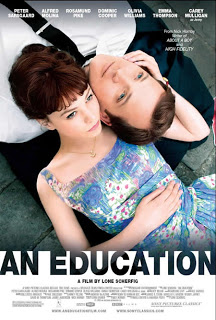During our Oscar round-up, Jesseca Cornelson reviewed An Education. Women & Hollywood also reviewed the film. Guest reviewer Rachel Feldman wrote:
As a feminist mom, my big ax to grind in popular culture is vulgarism. I don’t want my son to grow up one more immature, boob-obsessed male with little understanding or appreciation of a female’s character or her anatomy and so I appreciated that the film did not weigh the impact of Jenny’s transgression on the loss of her virginity alone. Yes, the headmistress, a wonderful Emma Thompson, alluded to the fact that a non-virgin would not have a place in her school, but no one else, including her own parents, highlighted the loss of her virginity as the sole focus of her misguidedness. We are a culture that had devoted entire movies to plots revolving around losing one’s virginity, often stories that minimize this precious bridge to adulthood as something a character wants to get or get rid of. But in AN EDUCATION, betrayal was the true ruiner and I was glad for our son to see a movie that certainly did not make light of her loss but placed the emphasis on a broader set of values of which her virginity was only a part.
And, check out the Dana Stevens review on Slate. An excerpt:
The release of this film on the heels of the Roman Polanski and David Letterman scandals will make, if nothing else, for some lively post-movie conversations. David and Jenny’s sexual relationship is consensual, but what does consent mean between a 16-year-old and a man in his mid-30s? David is creepy, yes, but ultimately the film wants us to file his and Jenny’s affair under the category of “youthful mistakes we’re glad we made.” Jenny seems so self-possessed, and blossoms so visibly under David’s tutelage, that you find yourself rooting for her as she schemes to deceive her parents.
Maryann Johanson over at FlickFilospher had this to say:
It’s almost an unneeded bonus that An Education is that rarity: a movie about a female character that treats her like a person, and not like a prize or a foil or a motivating factor for the flawed hero to make himself a better man so as to be worthy of her. The cinematic pedestal that The Movies so often put women on — as faultless and complete, as unrequiring of growth… as, in other words, less than human — is nowhere in sight here. And that may be the most exhilarating thing about this wonderful, wonderful film.
There’s also an interesting Japanese film releasing on DVD called High Kick Girl! I haven’t heard much about the movie, but the 25-second trailer got some hype awhile back. The people at Spank the Monkey argued that it didn’t live up to its feminist principles:
About halfway through, Kei undertakes an audition for The Destroyers, which is entertaining enough as an orgy of schoolgirl-on-schoolgirl violence. But after that, the focus switches away from Kei, and it becomes a film about her being rescued from The Destroyers by Matsumura. As The BBG noted, we paid to see High Kick Girl!, not High Kick Girl’s Sensei Saving Her Sorry Ass! The target audience for this film falls into two camps – feminists rooting for a strong female character, and men with a more fetishistic agenda – and turning Kei into a mere woman-in-peril for half the running time is nothing less than a betrayal of that audience, regardless of their motives.
Here’s the full-length trailer.
A film from 1968, Separation, releases on DVD as well. Written by and starring Jane Arden, the movie has been talked about as an early piece of feminist cinema. Brandon DuHamel writes:
A perplexing, enigmatic and surreal exploration of feminist ideals, Separation finds Arden portraying the 39-year-old “Jane,” a woman separated from her husband, before Britain’s 1969 Divorce Reformation Act, and exploring her newfound sexual freedom. The film was not well received by critics upon its release in 1968 and it is not difficult to understand why. Separation fails to follow any strict narrative and neither does it put forth its feminist viewpoint assuredly. In fact, Separation is masked in a veil of post-war, 1960s Western anxiety. It could be easily interpreted as a woman’s descent into madness, schizophrenia and masochism. Take one scene that shows a woman having her hair roughly clipped by a man as she begs to have it torn out by its roots.
Of course, one could also look upon this imagery, such as another naked woman being slapped by a gloved man as she is massaged by another woman, as visualizations of the humiliation and subjugation that women have endured at the hands of men over the years and the natural anxiety that comes with parting ways with someone you’ve attached yourself to for so many years.
In television, Sports Night! I love this show. Here’s a brief synopsis.
Smart, fast-paced, witty and featuring a fine ensemble cast, Sports Night struggled in the ratings from the start, particularly during its second season, when it was routinely pre-empted and moved from night to night. Art imitated life imitating art, as the show took on a consultant (William H. Macy in his first TV role since his stint on ER), was hired to “tweak” the ratings. The show within a show continued to falter, amidst rumors of the imminent sale of its network and the subsequent gutting of its staff, until it, like its parent Sports Night, simply disappeared from the schedule. Upon its cancellation, several networks, most notably HBO came to Sorkin for a possible move to the respected network, but nothing was ever solidified.
Do yourself a favor and rent it.




